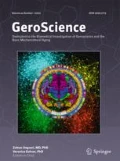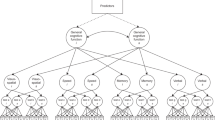Abstract
Moderate alcohol consumption (one to two drinks per day) has been associated with better cognitive function and lower risk of developing dementia in the elderly. In light of alcohol’s well-known neurotoxic properties, more evidence from well-controlled population-based studies is required. The objective of this study was to examine whether self-reported alcohol intake at age 70 is linked to cognitive function (assessed by trail making tests (TMTs) A and B, which are measures of attention, mental speed, and flexibility) in a population-based cohort consisting of 652 cognitively healthy elderly men. Linear regression models were used to assess both cross-sectional (i.e., age 70) and prospective (i.e., age 77) associations between alcohol intake and cognitive function. The analyses were adjusted for education, body mass index, energy intake, self-reported physical activity, smoking, a history of hypertension or diabetes, apolipoprotein E ε4 status, and cholesterol levels at the age of 70. Baseline data were obtained from 1990 to 1996. Self-reported alcohol intake (mean 6.9 ± 7.1 g/day) was associated with better performance on TMT-B at ages 70 and 77 (β = −0.87, p < 0.001). In contrast, alcohol intake was not predictive of the difference in performance on these tests between ages 70 and 77. Despite cross-sectional associations with performance in a test of executive functioning, moderate intake of alcohol was not linked to differences in cognitive performance between ages 70 and 77 in the present study. Thus, our findings do not support the view that daily moderate alcohol consumption is a recommendable strategy to slow cognitive aging in elderly populations.


Similar content being viewed by others
References
Alfonso-Loeches S, Guerri C (2011) Molecular and behavioral aspects of the actions of alcohol on the adult and developing brain. Crit Rev Clin Lab Sci 48(1):19–47
American Diabetes Association (1997) Clinical practice recommendations 1997. Diabetes Care 20:S1–S70
Bond GE, Burr RL, McCurry SM, Rice MM, Borenstein AR, Larson EB (2005) Alcohol and cognitive performance: a longitudinal study of older Japanese Americans. The Kame Project. Int Psychogeriatr 17(04):653–668
Carlsson S, Hammar N, Grill V, Kaprio J (2003) Alcohol consumption and the incidence of type 2 diabetes: a 20-year follow-up of the Finnish Twin Cohort Study. Diabetes Care 26(10):2785–2790
Carmelli D, Swan GE, Reed T, Schellenberg GD, Christian JC (1999) The effect of apolipoprotein E ε4 in the relationships of smoking and drinking to cognitive function. Neuroepidemiology 18(3):125–133
Cervilla JA, Prince M, Mann A (2000) Smoking, drinking, and incident cognitive impairment: a cohort community based study included in the Gospel Oak project. J Neurol Neurosurg Psychiatry 68(5):622–626
Collins M, Neafsey E (2012) Neuroinflammatory pathways in binge alcohol-induced neuronal degeneration: oxidative stress cascade involving aquaporin, brain edema, and phospholipase A2 activation. Neurotox Res 21(1):70–78
de Bruin EA, Hulshoff Pol HE, Schnack HG, Janssen J, Bijl S, Evans AC, Leon Kenemans J, Kahn RS, Verbaten MN (2005) Focal brain matter differences associated with lifetime alcohol intake and visual attention in male but not in female non-alcohol-dependent drinkers. NeuroImage 26(2):536–545
Dent OF, Sulway MR, Broe GA, Creasey H, Kos SC, Jorm AF, Tennant C, Fairley MJ (1997) Alcohol consumption and cognitive performance in a random sample of Australian soldiers who served in the second world war. BMJ 314(7095):1655
Elias PK, Elias MF, D'Agostino RB, Silbershatz H, Wolf PA (1999) Alcohol consumption and cognitive performance in the Framingham Heart Study. Am J Epidemiol 150(6):580–589
Folstein MF, Folstein SE, McHugh PR (1975) “Mini-mental state”: a practical method for grading the cognitive state of patients for the clinician. J Psychiatr Res 12(3):189–198
Giovagnoli AR, Pesce M, Mascheroni S, Simoncelli M, Laiacona M, Capitani E (1996) Trail making test: normative values from 287 normal adult controls. Ital J Neurol Sci 17(4):305–309
Huang W, Qiu C, Winblad B, Fratiflioni L (2002) Alcohol consumption and incidence of dementia in a community sample aged 75 years and older. J Clin Epidemiol 55(10):959–964
Launer LJ, Feskens EJM, Kalmijn S, Kromhout D (1996) Smoking, drinking, and thinking: The Zutphen Elderly Study: the Zutphen Elderly Study. Am J Epidemiol 143(3):219–227
Leibovici D, Ritchie K, Ledésert B, Touchon J (1999) The effects of wine and tobacco consumption on cognitive performance in the elderly: a longitudinal study of relative risk. Int J Epidemiol 28(1):77–81
Lezak M (1995) Neuropsychological assessment. Oxford University Press, New York
Lindeman RD, Wayne SJ, Baumgartner RN, Garry PJ (2005) Cognitive function in drinkers compared to abstainers in The New Mexico Elder Health Survey. J Gerontol Ser A Biol Sci Med Sci 60(8):1065–1070
McGuire L, Ajani U, Ford E (2007) Cognitive functioning in late life: the impact of moderate alcohol consumption. Ann Epidemiol 17(2):93–99
Moore RD, Pearson TA (1986) Moderate alcohol consumption and coronary artery disease. A review. Medicine 65(4):242–267
Mungas D (1991) In-office mental status testing: a practical guide. Geriatrics 46(7):54–58, 63, 66
Neafsey E, Collins M (2011) Moderate alcohol consumption and cognitive risk. Neuropsychiatr Dis Treat 7:465–484
Ngandu T, Helkala EL, Soininen H, Winblad B, Tuomilehto J, Nissinen A, Kivipelto M (2007) Alcohol drinking and cognitive functions: findings from the Cardiovascular Risk Factors Aging and Dementia (CAIDE) Study. Dement Geriatr Cogn Disord 23(3):140–149
Panza F, Frisardi V, Seripa D, Logroscino G, Santamato A, Imbimbo BP, Scafato E, Pilotto A, Solfrizzi V (2012) Alcohol consumption in mild cognitive impairment and dementia: harmful or neuroprotective? Int J Geriatr Psychiatr 27(12):1218–1238
Reid MC, Van Ness PH, Hawkins KA, Towle V, Concato J, Guo Z (2006) Light to moderate alcohol consumption is associated with better cognitive function among older male veterans receiving primary care. J Geriatr Psychiatr Neurol 19(2):98–105
Rimm E, Klatsky A, Grobbee D, Stampfer M (1996) Review of moderate alcohol consumption and reduced risk of coronary heart disease: is the effect due to beer, wine, or spirits? BMJ 312(7033):731–736
Risérus U, Ingelsson E (2007) Alcohol intake, insulin resistance, and abdominal obesity in elderly men. Obesity 15(7):1766–1773
Ronksley PE, Brien SE, Turner BJ, Mukamal KJ, Ghali WA (2011) Association of alcohol consumption with selected cardiovascular disease outcomes: a systematic review and meta-analysis. BMJ 342:d671
Ruitenberg A, Van Swieten J, Witteman J, Mehta K, van Duijn C, Hofman A, Breteler M (2002) Alcohol consumption and risk of dementia: the Rotterdam Study. Lancet 359:281–286
Sacco RL, Elkind M, Boden-Albala B et al (1999) The protective effect of moderate alcohol consumption on ischemic stroke. JAMA 281(1):53–60
Sachdev PS, Chen X, Wen W, Anstry KJ (2008) Light to moderate alcohol use is associated with increased cortical gray matter in middle-aged men: a voxel-based morphometric study. Psychiatry Res Neuroimaging 163(1):61–69
Stampfer MJ, Kang JH, Chen J, Cherry R, Grodstein F (2005) Effects of moderate alcohol consumption on cognitive function in women. N Engl J Med 352(3):245–253
Weyerer S, Schäufele M, Wiese B, Maier W, Tebarth F, van den Bussche H, Pentzek M, Bickel H, Luppa M, S.G. Riedel-Heller for the German AgeCoDe Study group (2011) Current alcohol consumption and its relationship to incident dementia: results from a 3-year follow-up study among primary care attenders aged 75 years and older. Age Ageing 40(4):456–463
Wiberg B, Lind L, Kilander L, Zethelius B, Sundelöf JE, Sundström J (2010) Cognitive function and risk of stroke in elderly men. Neurology 74(5):379–385
Acknowledgments
This work was supported by the Swedish Research Council, Åhlens stiftelse, Swedish Brain Research Foundation, Tore Nilsons Foundation, Fredrik och Ingrid Thurings Foundation, Brain Foundation, Åke Wiberg Foundation, and Novo Nordisk Foundation.
Author information
Authors and Affiliations
Corresponding authors
Additional information
Pleunie S Hogenkamp and Christian Benedict contributed equally to this work.
About this article
Cite this article
Hogenkamp, P.S., Benedict, C., Sjögren, P. et al. Late-life alcohol consumption and cognitive function in elderly men. AGE 36, 243–249 (2014). https://doi.org/10.1007/s11357-013-9538-7
Received:
Accepted:
Published:
Issue Date:
DOI: https://doi.org/10.1007/s11357-013-9538-7




